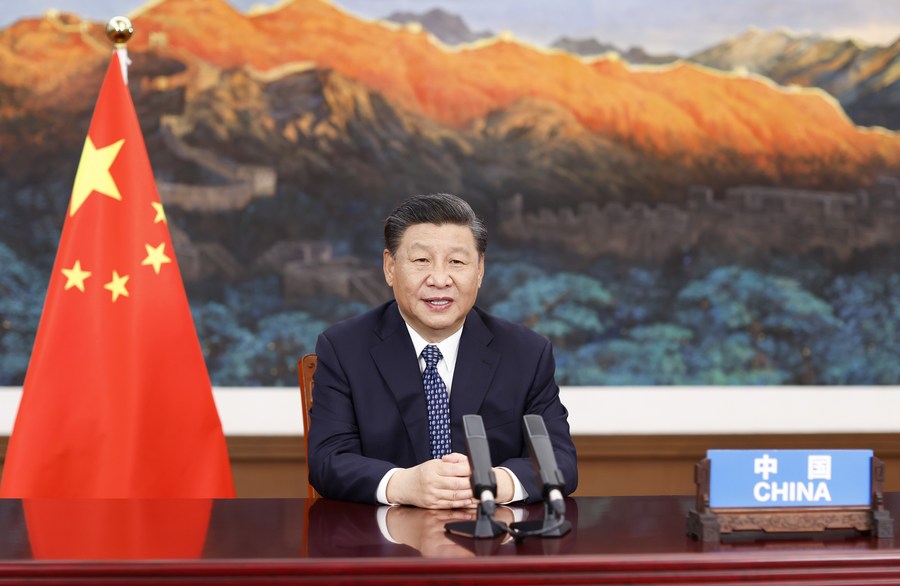BEIJING, May 22 — Chinese President Xi Jinping on Friday pledged to provide more COVID-19 vaccines to the best of China’s ability to the world, calling for rejection of vaccine nationalism to make vaccines more accessible and affordable in developing countries.
Xi made the remarks via video at the Global Health Summit, which was co-hosted by Italy, which currently holds the G20 presidency, and the European Commission.
REJECTING VACCINE NATIONALISM
“It is imperative for us to reject vaccine nationalism and find solutions to issues concerning the production capacity and distribution of vaccines, in order to make vaccines more accessible and affordable in developing countries,” Xi said, calling for upholding fairness and equity to close the immunization gap.
Having already supplied 300 million doses of vaccines to the world, China will provide still more vaccines to the best of its ability, he said.
The Chinese president also pledged to support its vaccine companies in transferring technologies to other developing countries and carrying out joint production with them.
“Having announced support for waiving intellectual property rights on COVID-19 vaccines, China also supports the World Trade Organization and other international institutions in making an early decision on this matter,” he said.
Xi proposed setting up an international forum on vaccine cooperation for vaccine-developing and producing countries, companies and other stakeholders to explore ways of promoting fair and equitable distribution of vaccines around the world.
“Vaccines are powerful tools in the fight against the pandemic. Yet, the problem of uneven vaccination has become more acute, as some developed Western countries are hoarding vaccines while offering nothing but superficial lip service to countries in urgent need,” said Su Xiaohui, a researcher with the China Institute of International Studies.
Notwithstanding the limited production capacity and enormous demand at home, China has honored its commitment by providing free vaccines to more than 80 developing countries in urgent need and exporting vaccines to 43 countries.
MAKING EXTRAORDINARY RESPONSE
In the face of continuing ravages of the pandemic, with repeated resurgence and frequent mutations of the coronavirus, Xi called for putting people’s lives and health front and center, demonstrating a great sense of political responsibility and courage, and making extraordinary responses to an extraordinary challenge.
He called on G20 members to adopt responsible macro-economic policies and step up coordination to keep the global industrial and supply chains safe and smooth.
“It is essential to give continued support by such means as debt suspension and development aid to developing countries, especially vulnerable countries facing exceptional difficulties,” Xi said.
China is fully implementing the G20 Debt Service Suspension Initiative for Poorest Countries and has so far put off debt repayment exceeding 1.3 billion U.S. dollars, the highest deferral amount among G20 members. China has also provided 2 billion U.S. dollars in assistance for the COVID-19 response and economic and social recovery in developing countries hit by the pandemic.
Members of the Chinese medical expert team communicate with local frontline health workers at a COVID-19 testing facility in Juba, South Sudan, Aug. 21, 2020. (Chinese Embassy in South Sudan/Handout via Xinhua)
At the summit, Xi announced that China will provide an additional 3 billion U.S. dollars in international aid over the next three years to support COVID-19 response and economic and social recovery in other developing countries.
In addition to financial aid, China has sent medical supplies to more than 150 countries and 13 international organizations, providing more than 280 billion masks, 3.4 billion protective suits and 4 billion testing kits to the world.
“China has indeed walked the talk, demonstrating its undertaking as a major responsible country,” Su said.
BUILDING A COMMUNITY OF HEALTH FOR ALL
“The pandemic is yet another reminder that we humanity rise and fall together with a shared future,” Xi stressed.
The Chinese president called for championing the vision of building a global community of health for all and firmly rejecting any attempt to politicize, label or stigmatize the virus.
Chinese expert medical team members help a local doctor changing her mask in Belgrade, Serbia, on April 4, 2020. (Xinhua)
Political manipulation would not serve COVID-19 response on the domestic front. It would only disrupt international cooperation against the virus and bring greater harm to people around the world, he said.
Xi said G20 members need to shoulder responsibilities in global cooperation against the virus, and lose no time in remedying deficiencies, closing loopholes and strengthening weak links in a bid to enhance preparedness and capacity for coping with major public health emergencies.
Stressing the need to address both the symptoms and root causes, Xi suggested strengthening and leveraging the role of the UN and the WHO and improving the global disease prevention and control system to better prevent and respond to future pandemics.
“It is also important that we enhance our capacity of monitoring, early-warning and emergency response, our capacity of treatment of major pandemics, of contingency reserve and logistics, of fighting disinformation, and of providing support to developing countries,” Xi said.
“The virus respects no borders or races, and COVID-19 serves as a stark reminder that countries must rise above differences in geography, race, history, culture and social system and work together for a community with a shared future,” said Feng Zhongping, director of the Institute of European Studies of Chinese Academy of Social Sciences.










































